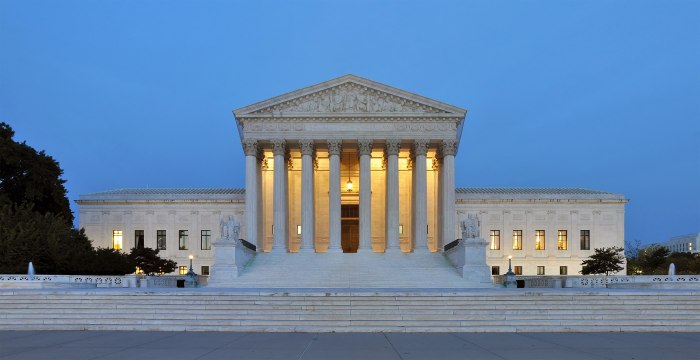Massachusetts Democrat to end 30-year Washington career as most famous out elected official
On a warm summer evening in 1980, the dance music at Buddies, then Boston’s premier gay bar, stopped at an uncharacteristically early hour, and an announcement came over the speakers that Pope John Paul II had ordered Father Robert Drinan, a liberal Democratic congressman who entered politics via the anti-war movement, to give up the seat he had held for a decade. Distressing as the news was that the conservative pope was reaching his long arm into Massachusetts politics, that coin had a flip side.
State Representative Barney Frank, a friend to the gay community in eight years on Beacon Hill, was headed to the bar to begin gathering petition signatures to succeed Drinan. Frank was not yet out, though certainly many in the crowd made the implicit assumption he was gay. At a time when few in the LGBT community were yet pressing closeted politicians to risk their careers by speaking openly about their sexuality, none among those who mobbed Frank to sign his petition that night raised the question of his going public about being gay.
Frank won the election that fall, but by the narrowest margin in his 16 House runs through 2010.
On November 28, the veteran Democrat –– the nation’s best known out elected official and a liberal lion –– announced he would not seek reelection in 2012.
Raised in Bayonne, New Jersey, Frank arrived in Massachusetts when he attended Harvard and Harvard Law School, but left a government studies Ph.D. program there in the late ‘60s to go to work for Boston Mayor Kevin White, first elected in 1967 as a reformer. From there, Frank went to the Massachusetts House of Representatives.
Frank’s State House District included parts of Boston and its affluent suburbs to the south and west, but his congressional district was confined to those suburbs and areas further to the southwest.
Frank’s reputation in the US House of Representatives will likely best be remembered for two distinct areas of influence –– his unabashed liberalism, even in the face of strong adverse winds, and his role in Wall Street regulation, including his four-year chairmanship of the Financial Services Committee.
In the immediate aftermath of 9-11 and during the lead-up to the war in Iraq 18 months later, many Democrats, including a good number of reliable progressives, were cowed by President George W. Bush’s use of the tragedy in pursuing a broad-ranging muscular show of US power globally and dramatically expanded intelligence gathering at home. Frank, however, was a vocal critic of both the Iraqi incursion and the Patriot Act.
In Manhattan in the fall of 2003, campaigning at an LGBT event for his fellow Massachusetts Democrat John Kerry’s presidential campaign, Frank was asked why he was supporting someone who had backed Bush on going into Iraq rather than an anti-war critic like Vermont Governor Howard Dean. With his trademark acerbic wit, Frank responded that if he thought somebody who agreed with him 100 percent of the time could be elected president, he would run himself.
Frank’s posture as one of Congress’ most consistently progressive voices did not mean he never found himself at odds with leaders in the LGBT community. In 2007, when the Employment Non-Discrimination Act got its only successful vote in the House, he was pilloried by many in the community for deciding to drop the bill’s protections for transgender Americans before taking it to the floor. The Human Rights Campaign, the leading LGBT lobby on Capitol Hill, supported Frank in that decision, but more than 300 other groups in the community, led by the National Gay and Lesbian Task Force and the National Center for Transgender Equality, opposed the move.
In the heat of that battle, Frank held a press conference to argue that it was a “moral” wrong to deny “protection to millions of people because you can't give it to millions plus several hundred thousands.”
Referring to the then House speaker, he said, “What will be the message that we will send if Nancy Pelosi, as strong an advocate of human rights for all people who has ever held high public office in the United States, if she is portrayed in the headlines as someone who says, ‘I give up, we can't pass the gay rights bill this year?’”
The anger directed at Frank was due, in part, to the fact that activists felt they had made progress in bringing him around on transgender rights. In earlier years, some had criticized him for the language he used in talking about the issue, but by 2007 he stated his view that gender identity and expression should be protected categories in the employment bill. His decision to later jettison that category, based he explained on his vote count, came as a wounding disappointment to many determined to see ENDA be a comprehensive jobs protection measure.
At times, Frank visibly chafed under the pressure, on one occasion arguing that out gay elected officials will make little headway if they are required to keep touching base with their LGBT constituents on every visit home to their districts.
In the financial services area, Frank, along with former Connecticut Senator Christopher Dodd, led the fight for the Wall Street Reform and Consumer Protection Act of 2010, the chief legislative response to the crisis that emerged in full bloom two years earlier. Intended to curb the abuses that led the global financial system to spiral out of control and to avoid any more “too-big-to-fail” bailouts, the measure did not attract Republican support, the GOP arguing simultaneously that the new law would guarantee more government bailouts of undeserving institutions and that it was too tough on Wall Street.
A good number at the other end of the political spectrum said the reforms did not go far enough, but Frank said he felt he got nearly everything he sought.
As the financial crisis engulfed the housing market, some of Frank’s conservative critics noted he had been among many in Congress who did not adequately foresee the abuses in lending practices that helped fuel the bubble in home prices.
Frank volleyed back hard, noting he had sought tightened regulation of Fannie Mae and Freddie Mac, the government-sponsored entities that are the leading players in the US mortgage market. He also pointed out that it was Republicans who led the push for financial deregulation in the late 1990s, and that he had championed a measure in 2007 to protect consumers against predatory lending and, in 2008, to establish a credit cardholders’ bill of rights.
Though Frank became America’s most prominent gay officeholder, he did not go public with his sexual orientation until 1987, four years after a Massachusetts House colleague, Democrat Gerry Studds, was outed in a congressional page scandal. When Frank came out –– at a time when his sexual orientation was increasingly being talked about by Washington insiders –– he chose the friendly venue of the Boston Globe’s society page, giving an exclusive interview to gay reporter John Robinson.
Frank’s honeymoon as an out gay member of Congress did not last long. Within two years, Stephen Gobie, who had shared the congressman’s Georgetown townhouse, told the conservative Washington Times that he had operated a prostitution service out of the residence with Frank’s knowledge.
Frank admitted he himself had paid Gobie for sex and had used personal funds to hire him for other jobs, but insisted he cut his ties to the young man when he learned of the hustling taking place in the townhouse.
Frank’s political career seemed in peril, and he suffered an overwhelming vote of reprimand from his House colleagues, though he survived efforts by Idaho Congressman Larry Craig –– decades later snared in his own gay sex scandal, arrested in a bathroom at the Minneapolis airport –– to have him expelled.
In the fall of 1990, his district offered a big shrug over the scandal, giving Frank a two-thirds vote of confidence in his reelection.



































